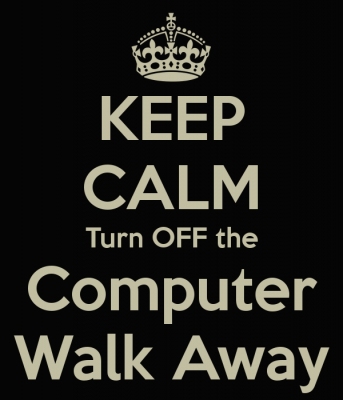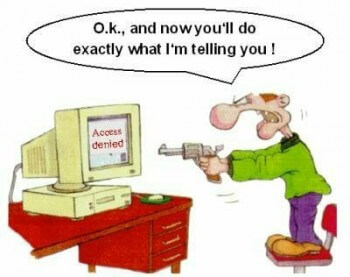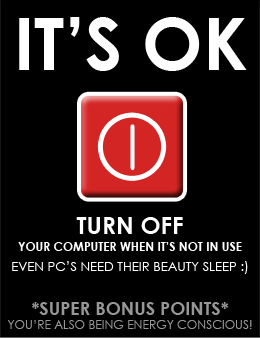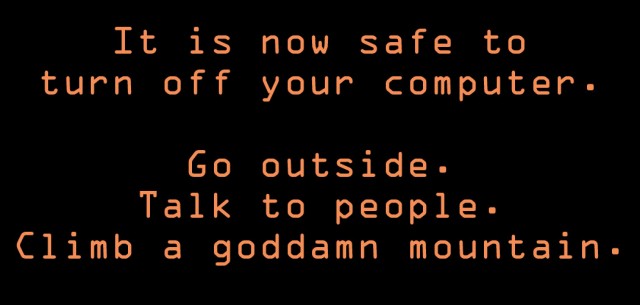Do you shut down your computer and electronic gadgets when you are not using them?
 In my “Camp Wired” computer classes that I teach weekly, I get this question often from students. There are so many different answers out there depending on who you talk to. This is a good topic for discussion to see what everyone’s opinions are.
In my “Camp Wired” computer classes that I teach weekly, I get this question often from students. There are so many different answers out there depending on who you talk to. This is a good topic for discussion to see what everyone’s opinions are.
So here is my professional and personal opinion. I will preface this with the fact that I am a computer repair technician and have been repairing computers since 1999. With that out of the way, If you use your computer throughout the day, it is best to leave it on. If you check your email once a day then do nothing else on your computer, then shut it down. The same applies to hardware like printers and scanners. When not in use, shut them off. This does not apply to cellphones though. Unless you want to miss messages. I have shut my cellphone off and gotten busy doing other things and wondered why the phone was not ringing. Doh!! Blonde moment on my behalf.
It’s good for your computer to be turned off, it clears the RAM closes any processes that you aren’t using that don’t boot at start up, etc. It’s definitely something that is worthwhile.
The other night I fell asleep while working and awoke to the room being illuminated like a Christmas tree and the sound of a message coming thru. (I had my speakers on high) I got over the initial shock and after catching my breath, and my pulse slowly going back to normal, I shut the dang thing off completely. I also forgot to add I swore like a sailor at the computer. It was definitely not G rated.
The only time it becomes a real problem is if you shut them down incorrectly. Taking your vengeance and stress out by ripping the power cord out  while laughing like a maniac. Well…then you have a problem. I have to admit there have been times I wanted to feel like King Kong and rip the cord out & toss the computer out the window, but then realized what would I have to gain by doing that?
while laughing like a maniac. Well…then you have a problem. I have to admit there have been times I wanted to feel like King Kong and rip the cord out & toss the computer out the window, but then realized what would I have to gain by doing that?
Think of it this way too. Even though computers have fans they heat up when they are turned on and heat is one of the enemies when it comes to computers. Hardware has mechanical parts that will fail eventually, so take that into consideration as well.
Many people are concerned about the cost of the power usage for devices to be plugged in. Some devices use more power than others. A tablet on a charger will not use the same amount of power as a Desktop computer that is left on. However, if a cell phone is finished charging, you should then then unplug the charger as it will still draw power even though your phone is not connected.
 Leaving your gadgets on all the time will not hurt them but consider the security threats that might.
Leaving your gadgets on all the time will not hurt them but consider the security threats that might.
There are so many school of thoughts this is a good topic to see what others might think.
Reasons to leave them on
- You are generally not a patient person and hate having to wait for anything to power up.
- There are updates or scans or other activities you would like to occur when you are not present.
- You’re using the computer as a server and want to access it remotely.
Reasons to turn them off
- Computer performance benefits with a reboot from time to time.
- You don’t want to be bothered by fan noise or notifications on screen.
- leaving it on wastes electricity and brings up your electric bill.
- less activity = less stress placed on components, will contribute to a longer lifespan for your computer.


Another excellent report showing both views. One computer remains on 24/7 because it’s used to monitor the phone, repelling unknowns, private callers and those listed are telemarketers. The other used for d/l torrents can also stay on most of the time, though for extended times it’s off. Totally agree that restarts keep the computer fresh, and todays units are still built solid. I still use and rely on a 486 for DOS programs, and though very dated, was purchased second hand and used prior as a server.
Keeping the units away from dust, cleaning them twice yearly, does extend their life. As for the electrical consumption, it’s minor as it’s also monitored. The screens go into standby mode, and NO external programs play through the speakers, which are also on 24/7 (even when the computer is switched off).
Years ago, I followed a topic which reported that the turning on/off state of electronics was just as responsible for the length of life units received, as those kept on 24/7. My own results using a simple light bulb has proven that they too can die at the hands of a switch.
I’ve yet to experience a failure due to extreme heat, Mindblower!
Mindblower,
I have 1 Dell laptop I upgraded from Vista to Windows 8. It runs very hot & literally shuts itself off. The fans are fine on it & I keep it clean. I think it has to do with the specific design of this model. It is a Dell studio that was given to me for nothing. I shut my computers down every night. I have 7, but if I am not using a specific one it is not even turned on at all. I tell most people that I have replaced springs on some older HP desktop power buttons….from people turning them on/off constantly. It is not necessary at all to do it that much.
What about sleep mode? Are the circuits still live? The HD has spun down, the monitor is on standby. I agree on off is good once in a while but maybe at what 5 Watts this is low energy and low stress.
I am from the older Compaq generation…computers are assembled with dissimilar metals which causes different expansion and contraction with temp changes…hence leaving your PC on 24/7 maintains a constant temp reducing the changes on the metals..the screws and nuts will loosen over time as they expand and contract thereby causing connections to fail
Excellent article. Pros and cons are presented clearly. Thank you.
Would be good to hear a comparison between laptops and desktops on this subject. It’s a long time since I actually used a desktop computer.
Also please explain the relative benefits of Sleep and Hibernate.